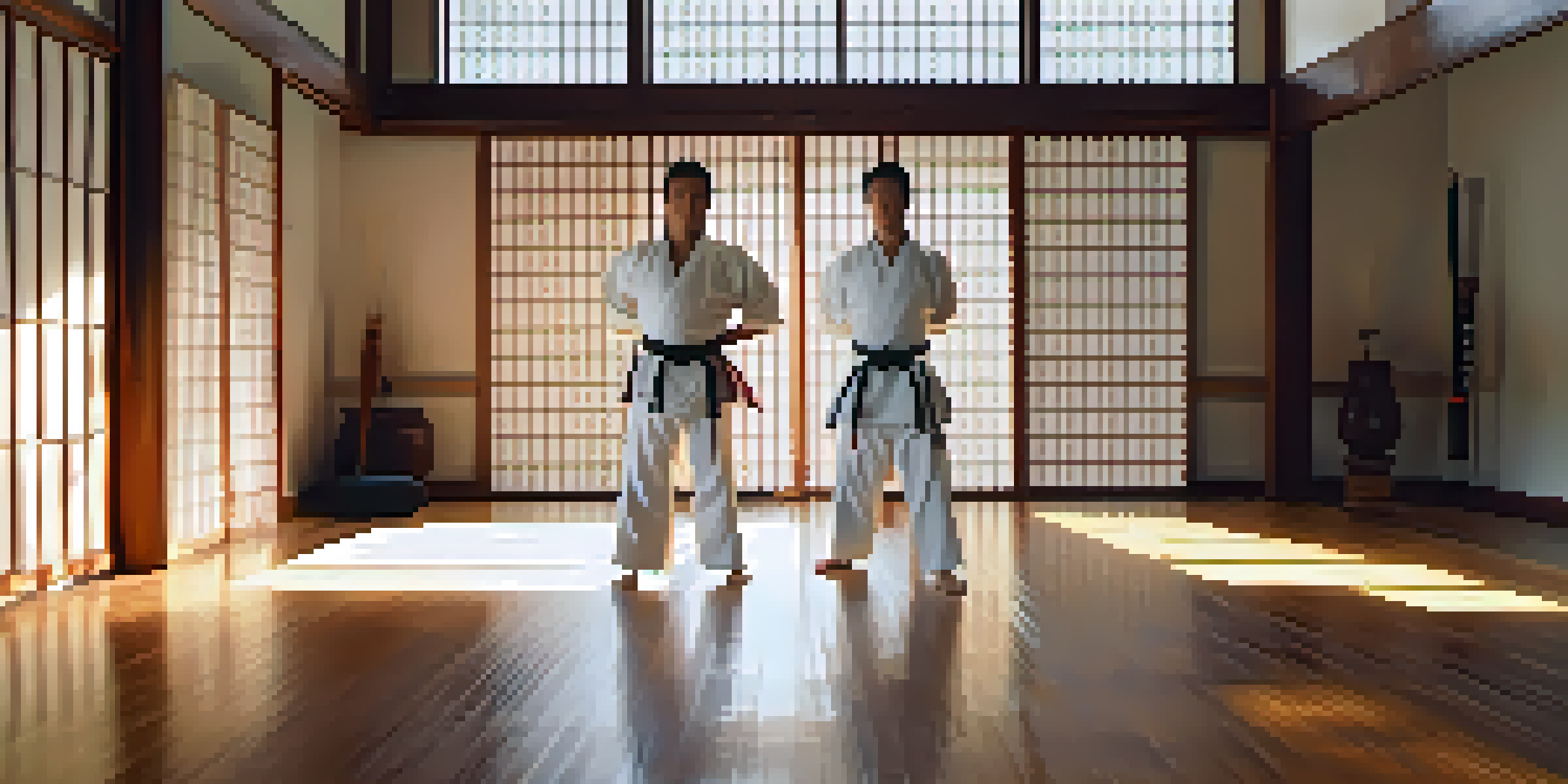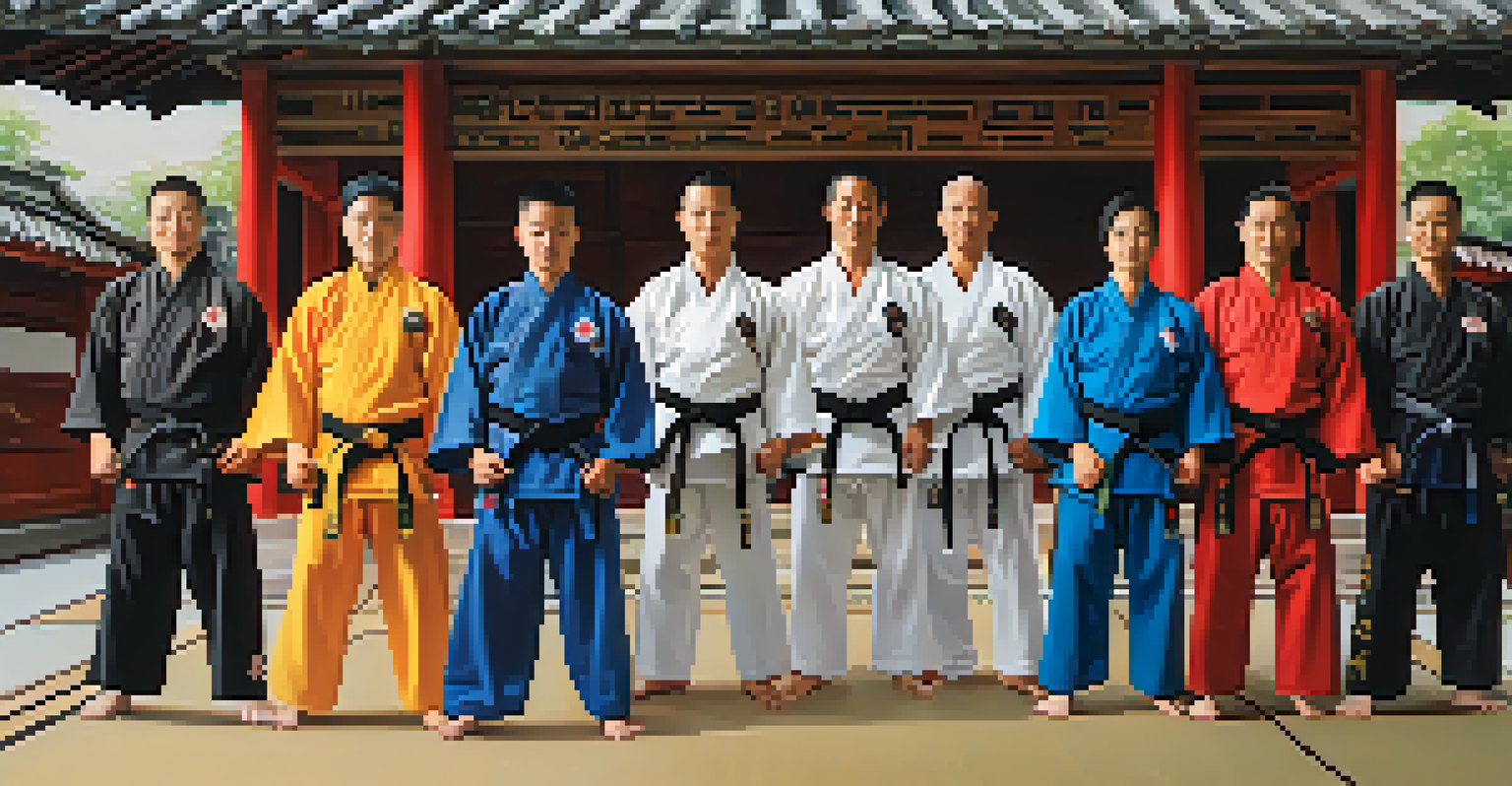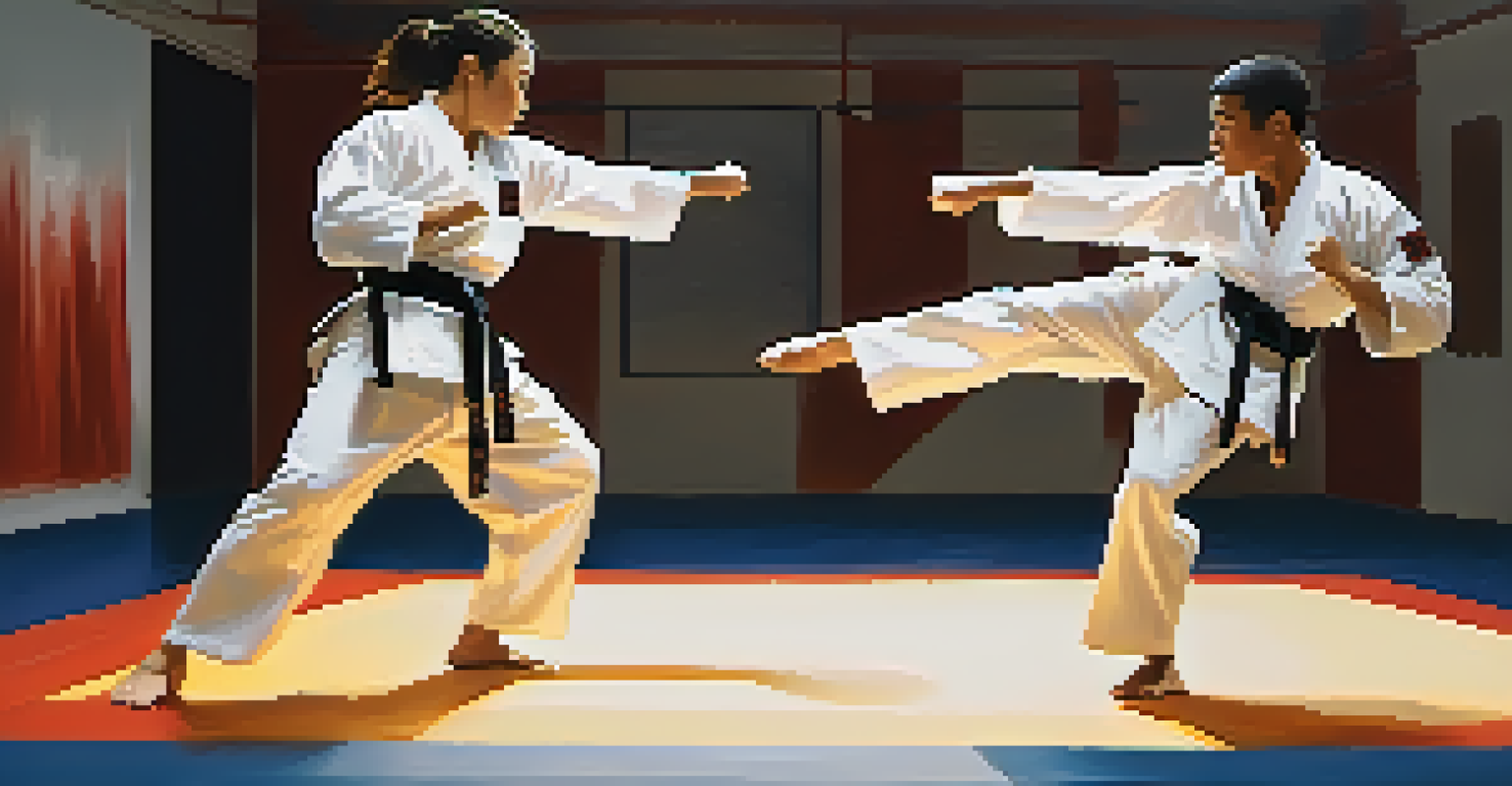Martial Arts Philosophy: Shaping Identity Through Practice

Understanding Martial Arts Philosophy and Its Importance
Martial arts philosophy is more than just techniques and moves; it's the backbone of martial arts practice. It encompasses the values, ethics, and mental frameworks that guide practitioners in their journey. By delving into this philosophy, individuals can gain insights into discipline, respect, and perseverance.
The ultimate aim of martial arts is not having to use them.
These philosophical tenets shape not only how martial artists train but also how they interact with the world around them. For instance, the principle of 'bushido' in Japanese martial arts emphasizes honor and loyalty, guiding practitioners to act with integrity. This connection between philosophy and practice helps form a cohesive identity that extends beyond the dojo.
Ultimately, understanding martial arts philosophy allows practitioners to internalize lessons that resonate in everyday life. From improving focus to fostering resilience, the impact is profound. It's a journey of self-discovery that shapes who we are as individuals and how we relate to others.
Cultivating Discipline Through Martial Arts Training
Discipline is a cornerstone of martial arts, and its cultivation begins with consistent practice. Training regularly instills a sense of commitment, pushing practitioners to overcome physical and mental barriers. This process not only enhances their skills but also builds a resilient character.

Consider the example of a student practicing their kata—a choreographed pattern of movements. Repeating these sequences requires focus and precision, teaching the importance of patience and dedication. Over time, the discipline developed in training translates into other aspects of life, such as academics or professional endeavors.
Martial Arts Philosophy Matters
Understanding martial arts philosophy enhances discipline, respect, and perseverance, shaping practitioners' identities.
Moreover, the structured environment of martial arts classes reinforces discipline through respect for instructors and fellow students. This framework cultivates a mindset ready to embrace challenges, fostering personal growth and a strong sense of identity. As discipline becomes ingrained, it empowers individuals to pursue their goals with unwavering determination.
The Role of Respect in Shaping Identity
Respect is a foundational element in martial arts, emphasized through rituals such as bowing before entering the dojo. This act symbolizes gratitude and recognition for the art and its practitioners. By instilling respect, martial arts teach individuals to value themselves and others, forming a core part of their identity.
Discipline is the bridge between goals and accomplishment.
In practice, respect manifests in various forms: listening to instructors, acknowledging peers, and honoring the tradition of martial arts. This culture fosters an environment where everyone can grow and learn together, reinforcing the idea that we are all part of a larger community. The more we practice respect, the more it shapes how we view our place in the world.
As martial artists develop their sense of respect, it often spills over into their daily lives. This newfound appreciation for others can lead to healthier relationships and a more compassionate worldview. Ultimately, respect becomes a guiding principle, shaping not just martial artists but also responsible members of society.
Finding Confidence Through Martial Arts Practice
Martial arts offer a unique avenue for building confidence, as practitioners confront their fears and insecurities on the mat. Every sparring session or competition presents an opportunity to push personal boundaries, fostering a sense of accomplishment. This boost in self-esteem can be transformative, leading individuals to embrace challenges in other areas of life.
For instance, a beginner might feel intimidated during their first class, but as they master new techniques and spar with others, their confidence grows. Each small victory reinforces the belief that they can achieve their goals, both in martial arts and beyond. This self-assurance often translates into a more positive self-image outside the dojo.
Building Confidence on the Mat
Martial arts training fosters confidence as individuals confront fears and achieve personal milestones.
Moreover, the supportive community within martial arts fosters encouragement and camaraderie. Practitioners cheer for each other during training and competitions, creating a nurturing environment. This sense of belonging further amplifies confidence, reminding individuals that they are part of something larger, strengthening their identity as martial artists.
Embracing Resilience Through Challenges
Resilience is a vital trait cultivated through the challenges faced in martial arts. Practitioners often encounter setbacks, whether in the form of difficult techniques or losses in competition. Learning to navigate these hurdles teaches individuals the importance of perseverance and adaptability.
Take, for example, a martial artist preparing for a belt test. The rigorous training and self-doubt can be overwhelming, but pushing through builds resilience. Each stumble along the way becomes a lesson, reinforcing the idea that failure is not the end but a stepping stone to success.
As martial artists embrace challenges, they develop a mindset that views obstacles as opportunities for growth. This perspective can have a profound impact on their identity, instilling a belief that they can overcome adversity in all aspects of life. Resilience becomes a key component of their character, shaping how they approach future challenges.
The Impact of Mindfulness in Martial Arts
Mindfulness plays a crucial role in martial arts, encouraging practitioners to remain present during training. This focus enhances performance, allowing individuals to engage fully with each movement and technique. By practicing mindfulness, martial artists cultivate a deeper connection to their bodies and minds.
For instance, during meditation or breathing exercises, practitioners learn to quiet their minds and focus on the present moment. This practice not only improves their martial arts skills but also promotes mental clarity and emotional regulation. The ability to center oneself becomes invaluable, both in the dojo and in daily life.
Community Shapes Identity
The sense of community in martial arts cultivates support and camaraderie, reinforcing individual growth and connection.
As mindfulness becomes a habitual practice, it helps individuals navigate stress and anxiety more effectively. This newfound awareness fosters a sense of calm and control, shaping their identity as composed and balanced individuals. Ultimately, martial arts serve as a powerful vehicle for cultivating mindfulness, enriching both personal and martial journeys.
Building Community and Connection in Martial Arts
Martial arts foster a strong sense of community, bringing together individuals from diverse backgrounds. The shared experience of training creates bonds that extend beyond the dojo, forming lasting friendships. This sense of belonging is vital in shaping identity, as practitioners find support and encouragement among their peers.
Participating in group classes, seminars, or competitions allows martial artists to connect on a deeper level. These interactions promote teamwork and camaraderie, reminding individuals that they are not alone in their journey. The encouragement from fellow practitioners can inspire growth and a stronger sense of self.

As students share their experiences, they learn from one another and develop a collective identity. This community aspect reinforces values such as respect and support, shaping how individuals perceive themselves and their role within the group. Ultimately, the connections forged in martial arts enrich personal identities and foster a sense of unity.